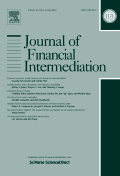
JOURNAL OF FINANCIAL INTERMEDIATION
Scope & Guideline
Driving excellence in financial research and policy.
Introduction
Aims and Scopes
- Financial Intermediation Services:
Research on the functions and services provided by financial intermediaries, including banks, investment firms, and other financial institutions, highlighting their roles in facilitating transactions, risk management, and capital allocation. - Impact of Regulations:
Analysis of the effects of financial regulations on markets and institutions, examining how regulatory frameworks shape lending practices, risk assessment, and overall financial stability. - Corporate Finance Dynamics:
Exploration of corporate finance issues, including capital structure, financing decisions, and the influence of financial intermediaries on corporate policies and performance. - Behavioral Finance and Decision-Making:
Investigation into how psychological factors and behavioral biases influence financial decision-making among investors, managers, and financial institutions. - Technological Innovations in Finance:
Focus on the intersection of finance and technology, particularly how fintech developments, such as blockchain and digital lending, are transforming traditional financial intermediation. - Market Efficiency and Information Asymmetry:
Study of how information asymmetries affect financial markets, including the role of intermediaries in mitigating these issues and enhancing market efficiency.
Trending and Emerging
- Fintech and Digital Transformation:
An increasing number of studies focus on the impact of fintech innovations on traditional banking and lending practices, exploring how technology reshapes financial intermediation. - Crisis Management and Resilience:
Recent research emphasizes the role of financial intermediaries in crisis situations, particularly how they navigate challenges and contribute to economic recovery during periods of financial distress. - Inter-firm Relationships and Networks:
There is a growing interest in the dynamics of relationships between firms and their financial intermediaries, examining how these interactions influence access to capital and corporate governance. - Sustainable Finance and ESG Factors:
Emerging research highlights the importance of environmental, social, and governance (ESG) factors in financial decision-making, reflecting a shift towards sustainability in investment strategies. - Behavioral Insights in Financial Decision-Making:
A trend towards incorporating behavioral finance insights into traditional financial theories, exploring how cognitive biases and social dynamics affect financial choices and market outcomes.
Declining or Waning
- Traditional Banking Models:
Research centered on conventional banking practices and models has decreased, possibly due to the rise of fintech and alternative lending solutions that challenge traditional paradigms. - Fixed Income Market Analysis:
Studies specifically focused on fixed income markets, including bond pricing and yield curves, have become less prevalent as the journal shifts towards broader themes involving dynamic financial instruments. - Historical Financial Crises:
While historical analyses of financial crises were once prominent, there appears to be a waning interest in purely retrospective studies, with a pivot towards contemporary crises and their implications. - Regulatory Compliance Mechanisms:
Research specifically detailing compliance strategies for financial regulations has seen a decrease, as the focus shifts towards understanding the broader impacts of regulation on market behavior and stability. - Static Risk Assessment Models:
Static models of risk assessment that do not incorporate dynamic market changes are becoming less favored in favor of more robust, adaptive models that account for real-time data and behavioral insights.
Similar Journals

JOURNAL OF FINANCIAL AND QUANTITATIVE ANALYSIS
Advancing the Frontiers of Financial ResearchJOURNAL OF FINANCIAL AND QUANTITATIVE ANALYSIS, published by Cambridge University Press, is a premier peer-reviewed journal that has been at the forefront of the finance and economics fields since its inception in 1966. With a notable impact factor reflecting its Q1 status in Accounting, Economics and Econometrics, and Finance for 2023, the journal is recognized for its substantial contributions to both theoretical and empirical research. Researchers and practitioners alike benefit from its comprehensive scope, addressing critical issues in financial analysis and quantitative methods. Although the journal does not currently offer open access, it remains widely accessible through institutional subscriptions. The editorial team is committed to fostering rigorous academic discussions that shape the future of finance and economics, making it an essential resource for academics, students, and industry professionals seeking to deepen their understanding of these vital disciplines. For more than five decades, this journal has continued to be an indispensable platform for disseminating influential research, thus solidifying its role as an essential cornerstone in the financial and quantitative analysis community.
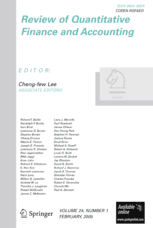
Review of Quantitative Finance and Accounting
Transforming Data into Knowledge in Finance and AccountingThe Review of Quantitative Finance and Accounting, published by Springer, is a distinguished academic journal that has been at the forefront of scholarly discourse since its inception in 1991. With an ISSN of 0924-865X and an E-ISSN of 1573-7179, this journal specializes in the interdisciplinary realms of accounting and finance, particularly emphasizing quantitative methodologies and their applications in real-world scenarios. With an impressive track record reflected in its 2023 rankings, it sits in the Q2 category across key fields such as Accounting, Business Management, and Finance, demonstrating its relevance and influence within these domains. Although it operates without an Open Access option, the journal's content remains vital for researchers, professionals, and students aiming to deepen their understanding of quantitative approaches in finance and accounting contexts. The Review of Quantitative Finance and Accounting stands as an essential resource for advancing knowledge and fostering innovation within these critical disciplines.
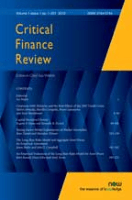
Critical Finance Review
Fostering collaboration for groundbreaking financial theories.Critical Finance Review is a premier academic journal dedicated to advancing the field of finance through the publication of high-quality research that spans various dimensions of the discipline. Published by NOW PUBLISHERS INC, this journal has quickly established itself as a leading source of innovative finance scholarship, achieving a notable Q1 classification in the 2023 finance category. Operating under a rigorous peer-review process, the journal ensures the academic integrity and relevance of its content, which attracts contributions from both emerging and established scholars. With an ISSN of 2164-5744 and E-ISSN 2164-5760, it is accessible to a global audience, though it operates under traditional access models. The journal welcomes a diverse range of topics including, but not limited to, risk management, financial markets, and quantitative finance, making it an essential resource for researchers, professionals, and students who are keen to explore the complexities of financial systems and develop new insights in the ever-evolving landscape of finance. Based in the United States, Critical Finance Review holds a significant position within the academic community, fostering a collaborative environment that encourages innovative thinking and practical applications of financial theories.
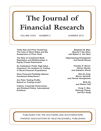
JOURNAL OF FINANCIAL RESEARCH
Illuminating Contemporary Challenges in FinanceThe JOURNAL OF FINANCIAL RESEARCH, published by WILEY, stands as a pivotal platform for disseminating innovative research in the fields of finance and accounting since its inception in 1978. With an ISSN of 0270-2592 and an E-ISSN of 1475-6803, this journal aims to address contemporary challenges and trends within the financial research landscape. It has achieved notable recognition, being placed in the Q2 category for both Finance and Accounting in the 2023 rankings, signifying its relevance and impact within the academic community. Although it does not currently offer open access, the journal is accessible through various academic databases, catering to a diverse audience of researchers, professionals, and students keen on advancing their knowledge and understanding of financial systems and methodologies. With an evolving scope that encompasses empirical studies, theoretical frameworks, and practical applications, the JOURNAL OF FINANCIAL RESEARCH is committed to contributing valuable insights into the complexities of financial practices and policies.
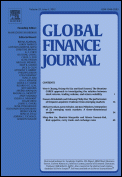
Global Finance Journal
Advancing knowledge in global finance.Global Finance Journal is an esteemed periodical published by Elsevier, dedicated to the dynamic fields of finance and economics. With an impressive history spanning from 1989 to 2024, this journal holds a significant position in the academic community, boasting a Q1 quartile ranking in both Economics and Econometrics, as well as Finance, as of 2023. It is highly regarded in Scopus rankings, placing 40th out of 317 in Finance and 99th out of 716 in Economics and Econometrics, demonstrating its influence and reach among researchers and practitioners alike. Although not an open-access journal, the Global Finance Journal provides rigorous peer-reviewed articles that explore critical issues, advance theoretical frameworks, and address practical applications in global finance. As such, it serves as a vital resource for researchers, financial professionals, and students aiming to deepen their understanding of economic phenomena and contribute to the ongoing discourse in these vibrant disciplines.

International Journal of Managerial Finance
Fostering knowledge that empowers financial leadership.The International Journal of Managerial Finance is a leading academic journal published by Emerald Group Publishing Ltd, dedicated to advancing the field of finance through rigorous research and scholarly discourse. Its ISSN is 1743-9132, with an E-ISSN of 1758-6569. Since its inception in 2005, the journal has provided valuable insights and frameworks that bridge theory and practice in managerial finance, making it an essential resource for researchers, professionals, and students alike. With its current standing at Q2 in both Business, Management and Accounting and Finance categories for 2023, and impressive Scopus ranks that place it in the 70th and 68th percentiles respectively, the journal is recognized for its high-quality contributions to the field. Though it does not currently offer open access, the rigorous selection process ensures that published articles are of the highest academic standard, providing a platform for significant discussions around contemporary issues in finance and management. The International Journal of Managerial Finance continues to play a pivotal role in shaping the discourse within the financial sector, fostering knowledge that is instrumental for effective managerial decision-making.
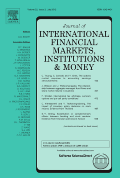
Journal of International Financial Markets Institutions & Money
Innovating Research in International FinanceThe Journal of International Financial Markets, Institutions & Money, published by Elsevier, serves as a leading platform for the dissemination of high-quality research in the fields of finance, economics, and econometrics. With an impressive impact factor reflected in its status as a Q1 journal in both categories for 2023, it ranks among the top journals, positioned at #47 out of 317 in Finance and #111 out of 716 in Economics. This journal offers a unique focus on the interplay between financial markets and institutions on a global scale, making it an essential resource for scholars, practitioners, and students alike. The journal welcomes innovative theoretical, empirical, and applied research, contributing to an exciting dialogue that shapes the future of international finance. For researchers looking to publish their findings, this journal is committed to rigorously engaging with contemporary financial phenomena, positioning itself as a vital cornerstone of academic and professional discourse.
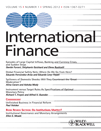
International Finance
Pioneering research at the intersection of finance and geography.International Finance is a prestigious academic journal published by WILEY, dedicated to the exploration and advancement of theories and practices in the realms of finance, development, and geography. With a strong emphasis on empirical and theoretical research, this journal provides a crucial platform for researchers, professionals, and students to disseminate cutting-edge findings that shape our understanding of the financial landscape on a global scale. Holding an impressive impact factor and categorized in the Q2 quartile across multiple disciplines, including Development, Finance, and Geography, the journal has established itself as a significant contributor to scholarly discourse. Since its inception in 1998 and spanning until 2024, International Finance offers a comprehensive overview of current trends and challenges faced in financial contexts, enhancing the decision-making processes within academia and industry alike. Although the journal is not open access, its rigorous peer-review process guarantees high-quality content that is indispensable for anyone engaged in the diverse fields intersecting with finance.
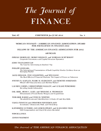
JOURNAL OF FINANCE
Innovative insights for a dynamic financial landscape.JOURNAL OF FINANCE, published by Wiley, stands as a premier academic journal in the fields of finance, economics, and accounting. With a history dating back to 1946, the journal has consistently delivered impactful research that shapes financial theory and practice, boasting an impressive impact factor reflective of its high citation rate. Its Quartile 1 ranking in Accounting, Economics and Econometrics, and Finance illustrates its leading position within these disciplines. Although not an open access publication, the journal continues to be indispensable for researchers, professionals, and students seeking to advance their understanding and knowledge through rigorous empirical analysis and comprehensive reviews. With an esteemed global readership, the JOURNAL OF FINANCE remains committed to fostering the dissemination of innovative financial research well into 2024 and beyond.

International Journal of Financial Studies
Exploring the forefront of financial innovation.The International Journal of Financial Studies is a premier publication dedicated to advancing the field of finance through open-access research. Published by MDPI based in Switzerland, this journal offers researchers, professionals, and students a platform to disseminate their findings in an accessible format since its establishment in 2013. With its ISSN of 2227-7072 and a commendable impact reflected in its Q2 ranking in finance, it occupies an influential position among finance-related journals, as evidenced by its 65th percentile rank in Scopus. The journal encompasses a wide array of topics in finance, making it essential reading for those seeking to stay abreast of current research trends and methodologies. As an open-access journal, all articles are freely available, significantly enhancing the visibility and reach of published studies, which is crucial for fostering collaboration and innovation within the global financial community. Published continuously until 2024, the International Journal of Financial Studies is not just a source of knowledge; it is a critical contributor to the progression of financial scholarship.